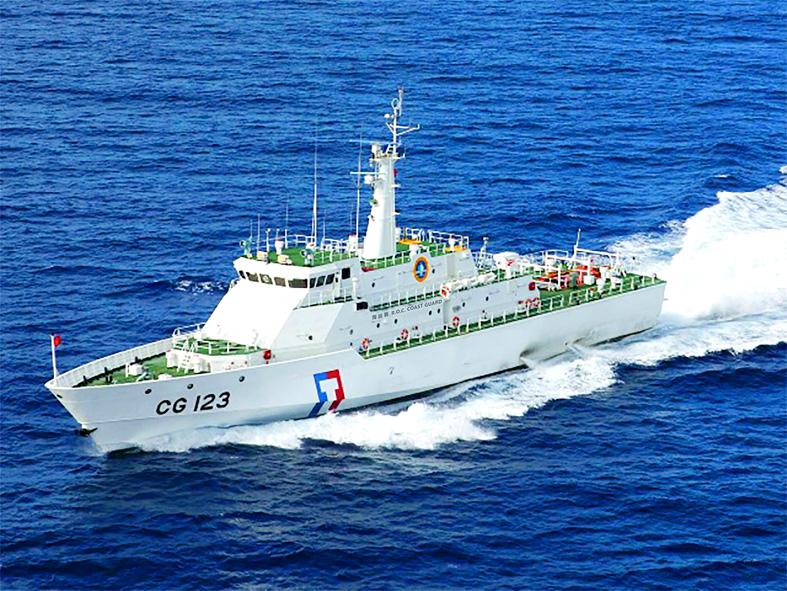The Ministry of National Defense has elaborated on the military’s countermeasures against China’s “gray-zone conflict” tactics in a comprehensive review of Taiwan’s defense strategy.
The ministry’s 2021 Quadrennial Defense Review, which was on Thursday delivered to the Legislative Yuan’s Foreign Affairs and National Defense Committee for review, highlights the Chinese People’s Liberation Army’s (PLA) increasing use of gray-zone conflict methods, including cognitive warfare, disinformation, and air and sea patrols.
The methods are employed by the PLA to exhaust Taiwan’s armed forces and morale, the ministry said.

Photo provided by the Coast Guard Administration via CNA
The PLA’s cognitive warfare strategy is based on the “three forms of warfare” concept, which refers to public opinion warfare, psychological warfare and legal warfare, which are conducted to create internal contradictions in Taiwan, the ministry said.
The ministry’s answer to cognitive warfare is the creation of rapid response mechanisms that use technology to counter disinformation, provide factual rebuttals across multiple media, stop public panic, and create counter-narratives with international partners, it said.
China has reorganized its forces to augment its cyberwarfare capabilities, and PLA cyberunits are deployed for intelligence gathering and for stealing military, industrial and commercial secrets, it said.
Another part of the PLA’s effort is directed toward identifying gaps in Taiwan’s cyberinfrastructure to exploit them, including attacking these targets during a war to paralyze the nation’s government, security forces and military, the ministry said.
The armed forces are to stop these threats by implementing information security mechanisms, increasing defensive capabilities and strengthening collaboration with cybersecurity agencies, it said.
The integration of military and civilian cybersecurity systems and the training of cybersecurity experts must be emphasized, the ministry added.
The PLA’s use of air and sea patrols to harass Taiwan is countered by the rapid deployment of reaction forces, the ministry said.
The military has made and will continue to make rolling adjustments to incident management protocols and the general combat readiness of the armed forces so that the military can anticipate and effectively respond to PLA actions, it said.
The command and control systems of the armed forces have facilitated intelligence sharing between Taiwan and its allies and the surveillance of enemy forces in the Taiwan Strait, and provided the nation with an early warning capability, it said.
In addition, the navy and the coast guard are committed to developing teamwork in peace and to redeploying coast guard vessels as naval assets in wartime in joint operations, it said.
The review is mandated by Article 31 of the National Defense Act (國防法), which states that the ministry must provide a review for the president within 10 months of inauguration.

Alain Robert, known as the "French Spider-Man," praised Alex Honnold as exceptionally well-prepared after the US climber completed a free solo ascent of Taipei 101 yesterday. Robert said Honnold's ascent of the 508m-tall skyscraper in just more than one-and-a-half hours without using safety ropes or equipment was a remarkable achievement. "This is my life," he said in an interview conducted in French, adding that he liked the feeling of being "on the edge of danger." The 63-year-old Frenchman climbed Taipei 101 using ropes in December 2004, taking about four hours to reach the top. On a one-to-10 scale of difficulty, Robert said Taipei 101

Taiwanese and US defense groups are collaborating to introduce deployable, semi-autonomous manufacturing systems for drones and components in a boost to the nation’s supply chain resilience. Taiwan’s G-Tech Optroelectronics Corp subsidiary GTOC and the US’ Aerkomm Inc on Friday announced an agreement with fellow US-based Firestorm Lab to adopt the latter’s xCell, a technology featuring 3D printers fitted in 6.1m container units. The systems enable aerial platforms and parts to be produced in high volumes from dispersed nodes capable of rapid redeployment, to minimize the risk of enemy strikes and to meet field requirements, they said. Firestorm chief technology officer Ian Muceus said

MORE FALL: An investigation into one of Xi’s key cronies, part of a broader ‘anti-corruption’ drive, indicates that he might have a deep distrust in the military, an expert said China’s latest military purge underscores systemic risks in its shift from collective leadership to sole rule under Chinese President Xi Jinping (習近平), and could disrupt its chain of command and military capabilities, a national security official said yesterday. If decisionmaking within the Chinese Communist Party has become “irrational” under one-man rule, the Taiwan Strait and the regional situation must be approached with extreme caution, given unforeseen risks, they added. The anonymous official made the remarks as China’s Central Military Commission Vice Chairman Zhang Youxia (張又俠) and Joint Staff Department Chief of Staff Liu Zhenli (劉振立) were reportedly being investigated for suspected “serious

American climber Alex Honnold is to attempt a free climb of Taipei 101 today at 9am, with traffic closures around the skyscraper. To accommodate the climb attempt and filming, the Taipei Department of Transportation said traffic controls would be enforced around the Taipei 101 area. If weather conditions delay the climb, the restrictions would be pushed back to tomorrow. Traffic controls would be in place today from 7am to 11am around the Taipei 101 area, the department said. Songzhi Road would be fully closed in both directions between Songlian Road and Xinyi Road Sec 5, it said, adding that bidirectional traffic controls would